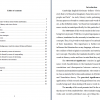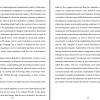Тема: Translation of nonce words in science fiction and fantasy genres in the comparative aspect (based on modern English novels) / Перевод окказионализмов в жанрах научной фантастики и фэнтези в сопоставительном аспекте (на материале современных англоязычных произведений)
Закажите новую по вашим требованиям
Представленный материал является образцом учебного исследования, примером структуры и содержания учебного исследования по заявленной теме. Размещён исключительно в информационных и ознакомительных целях.
Workspay.ru оказывает информационные услуги по сбору, обработке и структурированию материалов в соответствии с требованиями заказчика.
Размещение материала не означает публикацию произведения впервые и не предполагает передачу исключительных авторских прав третьим лицам.
Материал не предназначен для дословной сдачи в образовательные организации и требует самостоятельной переработки с соблюдением законодательства Российской Федерации об авторском праве и принципов академической добросовестности.
Авторские права на исходные материалы принадлежат их законным правообладателям. В случае возникновения вопросов, связанных с размещённым материалом, просим направить обращение через форму обратной связи.
📋 Содержание
Chapter 1. Translation of nonce words in science fiction and fantasy. 7
1.1 Genre characteristics of fantasy and science fiction 7
1.2 Notion of nonce words 9
1.2.1 Nonce word definition 9
1.2.2 Typology of nonce words 11
1.2.3 Nonce word formation strategies 13
1.3 Translation of nonce words 19
1.3.1 Translation transformations 22
Conclusions on chapter 1 26
Chapter 2. Methods of translating nonce words in science fiction and fantasy 28
2.1 Lexical nonce words 28
2.1.1 Lexical nonce words formed by means of derivation 28
2.1.2 Lexical nonce words formed by means of compounding 33
2.1.3 Lexical nonce words formed by means of shortening 39
2.1.4 Lexical nonce words formed by mixed means 41
2.2 Phonetic nonce words 47
2.3 Semantic nonce words 59
2.4 Occasional word-combinations 70
2.5 Grammatical nonce words 82
Conclusions on chapter 2 82
Conclusions 84
References 87
Dictionaries 92
Research material 93
📖 Введение
The relevance of this work consists in the issue of translating nonce words being forever present. With the ever-growing expanse of literary works onto other cultures, translators face the necessity to translate new words denoting unfamiliar concepts. Thus, it is pivotal to study types of occasional words and possible ways of their translation. This importance is further reinforced by the formative influence that literature has on any language, with new words sometimes escaping the confines of their original occasionality and entering the vernacular to denote new concepts. Therefore, the translator should be careful when translating nonce words in literary works and bear in mind that they might one day become more.
The theoretical significance consists in applying Russian and English nonce word classifications to the translated research material and discovering correlations and discrepancies between various typologies of nonce word formation and translation transformations. The results of this research can be used in class as material for lectures and seminars in Stylistics of the English language and Translation theory. The practical significance consists in the practical applications of this research being performed on actual literary material and its results being used when dealing with nonce words in real translation practice.
The novelty of this work presents itself in the abundance of new material that has never been studied before. These include examples from both older literary works and recently published ones, providing the opportunity to follow the possible changes in the more prominent word-formation patterns when it comes to creating nonce words in the source text and their translated analogues in target language.
The object of this research are the nonce words found in a selection of authentic English literary works of fantasy and science fiction genres, as well as their officially published translation into Russian.
The main subject of this research concerns applying various typologies of nonce words and translation techniques to the set of selected nonce words and their translation.
The goal is to determine patterns and methods in which translation theory is applied to the actual translation practice when dealing with the translation of nonce words. The research is set to achieve the following tasks:
● study the selected literary works and single out nonce words used in them, both in the original English texts and their Russian translations;
● study and apply various classifications of nonce words and translation methods to the research material;
● perform a comparative analysis of research material based on classifications;
● discover patterns in use of nonce words in fantasy and science fiction literary works and how they compare with methods of translation utilised.
The following research is going to be based on such methods as structural and word formation analysis, comparison between examples taken from works of different genres in two languages, quantitative analysis on the basis of the composed corpus of research material gathered from the selected literary works.
Theoretical framework for this research consists in works on linguistics by N.G. Babenko, A.G. Lykov, E.I. Hanpira, V.V. Lopatin, P. Stockwell; literary studies by E.N. Kovtun, V.L. Gopman, V.S. Muravyov; translation theory by L.S. Barkhudarov, Ya.I. Retsker, V.N. Komissarov, S.I. Vlahov, S.P. Florin, P. Newmark.
Research material includes scientific papers and literature on the topic, as well as the following fantasy and science fiction books under study with their respective officially published translations: Amy Sparkes, The House at the Edge of Magic; China Mieville, Un Lun Dun; Diana Wynne Jones, A Tale of Time City; Diana Wynne Jones, Castle in the Air; Diana Wynne Jones, Deep Secret; Diana Wynne Jones, House of Many Ways; Diana Wynne Jones, Howl's Moving Castle; Diana Wynne Jones, Power of Three; Diana Wynne Jones, The Dark Lord of Derkholm; Diana Wynne Jones, The Merlin Conspiracy; Martha Wells, Murderbot Diaries; Terry Pratchett, Hogfather; Terry Pratchett, Raising Steam!; Tony DiTerlizzi, The Search for WondLa; Trevor Baxendale, Doctor Who. Prisoner of the Daleks. A selection of 425 examples of nonce-formations has been made out of these literary works for further study and analysis.
The first chapter of this paper is dedicated to the theoretical basis for research. It touches upon the notions of science fiction and fantasy as genres, as well as nonce words and their various typologies and translation transformations. Chapter two concerns practical applications of said typologies of nonce words and translation transformations in real literary and translation practice on the basis of a selection of examples from authentic English texts and their published translations. Lastly, conclusions are made based on the results of the presented research.
✅ Заключение
Following a close study of thematically relevant classifications, certain authors and their respective classifications were selected for further study and application to the research material. Thus, the work follows nonce word classifications by N. G. Babenko and Stockwell, focusing on derivation, degrees of occasionality and contexts of use, as well as a classification of translation transformations comprised from particular translation strategies suggested by various scholars, following the paradigm of lexical, grammatical and lexico-grammatical transformations. These former classifications were applied to the original nonce words and their Russian translations, and then the latter classification was applied to determine the likely translation transformations utilised by the translator on the basis of a thorough analysis of formation of both the original and the translated nonce word.
A comparative analysis performed on the material showed patterns of similarities and differences between the nonce word classifications themselves, classes of original and translated nonce words and the dependence of shifts and correlations between classifications of the original nonce words and their translation on the translation transformations utilised. There are cases of both notable shifts in nonce word types in translation due to the differences in lexical and grammatical systems of both languages under study, and their complete correlation due to the nature of nonce word formation and translation; besides, there are cases of complete loss of occasionality. Regardless of the type of the original English nonce word, transcription and transliteration tend to yield nonce words of the phonetic type in translation. Translation via semantic neologism can create nonce words of any type based on the decisions made by the translator and the degree of derivational standard to which the translator chooses to adhere in creating such a neologism. Part of speech substitution, addition, modulation, contextual and descriptive translation might lead to the creation of an occasional word-combination due to the grammatical peculiarities of the target language which necessitate such lexico-grammatical changes. Generalisation, functional analogy and the use of a dictionary equivalent create semantic nonce words in translation, even if the original nonce word belonged to the lexical category. Functional analogy, along with calque, can be used to translate occasional word-combinations if the target language has a notion or expression that can be considered close to it in meaning. Loss of occasionality has been seen in a few cases of lexical nonce words being translated with the use of descriptive translation.
In terms of correlations between Babenko's classification of nonce words and Stockwell's nonce word formation classification, lexical nonce words are often formed by means of derivation, compounding and shortening, semantic nonce words are largely formed through recontextualisation, phonetic nonce words are mostly formed by means of creation and borrowing, while occasional word-combinations are primarily formed through compounding, as their creation involves combining words.
As for grammatical nonce words, no notable cases have been found in the research material.
The use of translation transformations in nonce word translation and the patterns of their formation do not seem to be linked directly to the genre peculiarities of science fiction and fantasy and are more dictated by the choices made by the original author and then the translator and vary accordingly. The context of a particular literary work, however, may influence the choice of translation transformations and word-formation strategies, as the role each nonce word plays in the story may differ from word to word (such as certain nonce words denoting reoccurring characters or notions central to the plot of the story, while others may denote mere singular passing mentions of a place or a term). Thus, as the context plays a major role in nonce word formation and the realisation of its meaning, the role the genre plays in nonce word creation becomes evident. Nonce words in both science fiction and fantasy share the categories of character names and geographic locations, as well as terms of scientific and magical nature respectively, occasional word-combinations of non-idiomatic nature and physical objects. The category of nonce words denoting hypothetical technological advancements is largely characteristic of science fiction, but can also feature in fantasy stories set in modern times as opposed to classical more historic fantasy setting, but such cases are few, as it is science fiction that, by definition, deals with scientific advancements. Occasional word-combinations of phraseological and idiomatic nature seem to be more or less characteristic not of a certain genre but rather the author. The use of shortening, more specifically abbreviation and acronymy, is more prominent in science fiction works, where it often denotes new concepts named with a peculiar combination of familiar words. As opposed to meaningful conceptual nomenclature, creation is often used in both genres to form proper names, names for unique species, places and concepts to stress the lack of any similar concepts outside the literary world of a particular story.





